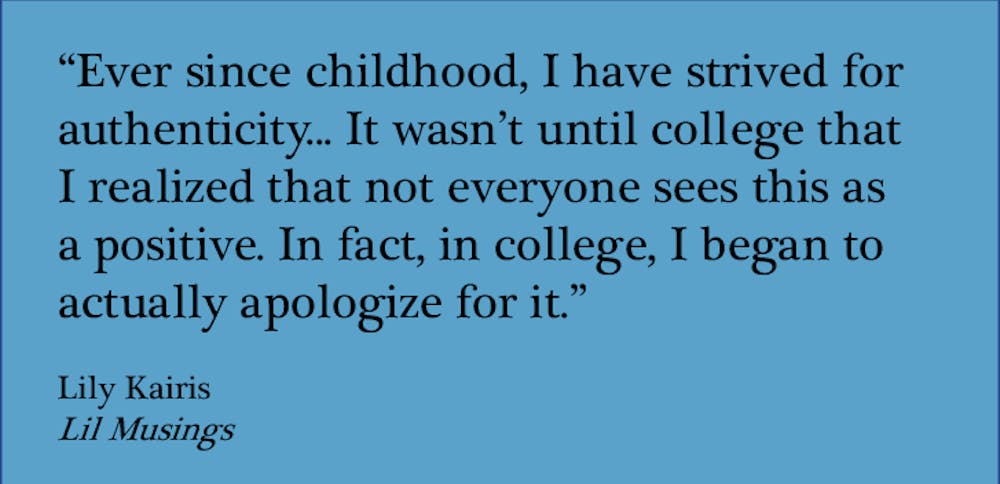
“It’s strange, but I actually find my sadness quite beautiful.” I said this a few days ago, over breakfast with a somewhat new friend, and I internally cringed. Did I really just say that? Have I hit the rock bottom of artistic pretentiousness?
Before I deprecate myself too much, let me rewind and explain. In my defense, this sentiment was not initially my own. It was my brother’s. We were having a heart-to-heart over the phone a few weeks ago, discussing how much he preferred his now solitary existence to his college environment. (My brother is the classic starving artist: currently taking music composition classes, producing his fourth album and working part-time at a restaurant in Philadelphia.)
Frankly I was perplexed. How on earth could a hermetic adult life supersede these four years of spontaneous adventures and bonding?
Then he made a remark that surprised me: “I finally have the space to fully experience my emotions rather than ignoring them. I missed that.”
When he said this, I choked on my own laughter. It seemed far too solemn a comment to mock, but I couldn’t help it.
“I mean, when you and I were kids, I feel like we had so much time to reflect, to recognize what was going on in our lives and embrace how we felt, even if it was negative. But then, in college, that goes away. You’re not encouraged to isolate yourself anymore. Instead, you constantly find distractions. You ignore what’s going on in your head so that you can seem busy and instead be productive. But I think that’s really selling yourself short.”
As I let these words sink in, I realized how much they resonated. Ever since childhood, I have strived for authenticity. I journal to understand myself; I listen to my friends with a goal of compassion; I share my stories in the hopes of connecting with an audience. I have always been unapologetically effusive. It wasn’t until college that I realized that not everyone sees this as a positive. In fact, in college, I began to actually apologize for it.
When my ex-boyfriend and I broke up, I felt wrong for mourning it. “I’m so sorry,” I would tell my friends, in between nose-blows and muffled sobs. “You don’t want to hear about this.” My friends would reassure me: It’s fine, we love you, and we want to be here for you.
Still, I felt so embarrassed for my weakness. I would imagine my ex plunging himself back into film projects and refusing to admit any sadness: a pattern of avoidance that I knew he (like so many of my Hopkins classmates) had mastered. I told myself that’s unhealthy. But some part of me still envied him. How I wished I knew how to compartmentalize like that.
Yet, as the months of heartbreak passed, I began to find bizarre satisfaction in my suffering. In February I began writing late at night, literally crying on my Mac keyboard as I frantically typed stream-of-consciousness sentences about intimacy and fear of abandonment.
In March I started taking long walks by myself through Charles Village, listening to Sufjan Stevens or Frank Ocean (artists that never cease to make me feel understood) and ruminating on my past, present and future. Then in the summer, when my ex and I spent two months straddling the line between friends and something more, I started writing essays that would become a personal blog, which eventually I mustered up the courage to publish. Long story short: My sentimental musings, in the end, actually made me more productive.
To this day, I still struggle with my tendency to emote. Sometimes, it can feel incredibly isolating. A few weeks ago, for instance, my mom told me that my father’s prostate cancer — which he underwent surgery for in my sophomore year — had recurred. The worry hit me like a steam engine. But when I reached out to him to offer support, he went cold. He changed the subject. “Anyway, how was your spring break? And your job search? Tell me about that.” Just like that, any discussion was off the table.
My father holds the Hopkins mentality: Emotions are a nuisance; forget them; focus on your career. In my childhood, I looked at this like I looked at my ex’s avoidance tactic — as a strength I wished I could possess. But recently I’ve realized my emotional intelligence is a strength, too. One that, to be honest, I think a lot of people could benefit from.
On that phone call with my brother, I recognized in him a kindred-ness that I had been looking for. Sometimes Hopkins can strike me as incredibly confining.
On a given day, if life has taken a toll on my mental health, I often look to my community for reassurance and understanding. And that’s not always what I get. Sometimes, when I want to talk to a friend about difficult topics, they get uncomfortable. They ask me to lighten up. While I consider myself an optimist and I am happy to choose gratitude over wallowing, I believe occasional sadness is not only necessary but beautiful.
So thank you to my brother, the starving, overly dramatic artist that you are, for helping me appreciate that.





